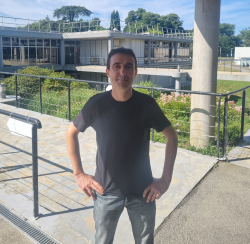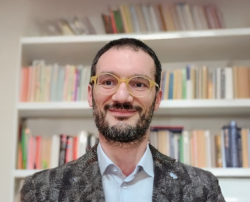Keynote Speakers
Guest Keynote Lecture: “SPH applied to complex Fluid Structure Interaction problems: key points and examples of challenging cases”
Wednesday, January 28, 2026
Dr. Guillaume Oger (Ecole Centrale Nantes/CNRS, France)

Abstract
The SPH method shows undeniable advantages when dealing with complex flows in interactions with large body movements or deformations, and possibly in presence of the free-surface. Its Lagrangian and meshless features are also convenient for its coupling with mesh-based methods such as the Finite Element method, allowing the simulation of a wide range of applications. This talk will address some key aspects of the SPH method when applied to challenging academic and industrial FSI problems, with a focus on the use of partitioned procedures.
Bio
Guillaume Oger started working on the Smoothed Particle Hydrodynamics method in 2003 during his PhD, and was graduated from the University of Nantes in 2006. His research activities include numerical modelling of high-dynamic free surface flows, Fluid-Structure Interactions (FSI), numerical modelling for health and hemodynamics, with a focus on High Performance Computing through distributed memory parallelization. Since 2011 he has been working as researcher at LHEEA of Ecole Centrale Nantes, addressing Smoothed Particle Hydrodynamics and other schemes such as Finite Volumes and Lattice Boltzmann methods.
Developer Keynote Lecture: “Recent Advances in DualSPHysics: ALE-SPH formulation, non-conservative pressure, and divergence cleaning”
Thursday, January 29, 2026
Dr. Renato Vacondio (University of Parma, Italy)

Abstract
This keynote will present recent developments integrated into DualSPHysics v5.4, focusing on a novel SPH formulation combining Arbitrary Lagrangian-Eulerian (ALE) terms with a non-conservative pressure approach. These enhancements aim to improve stability, reduce numerical dissipation, and extend the method's applicability to complex hydrodynamic problems. Additionally, the talk will introduce the implementation of divergence cleaning techniques to improve the enforcement of incompressibility in weakly compressible SPH formulations. Practical applications and benchmark results will be discussed to demonstrate the potential of these features.
Bio
Renato Vacondio is Associate Professor at the University of Parma, where he has been actively involved in the development of the DualSPHysics code since its early stages. His research focuses on the numerical modelling of free-surface flows, dam-break problems, and hydraulic structures using SPH. He has made key contributions to the inclusion of variable resolution, advanced boundary conditions, and high-order schemes in SPH. Dr. Vacondio is also serving as Chair of the SPHERIC Steering Committee.
